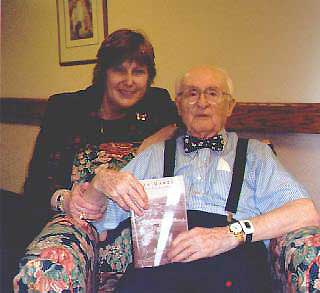Papa MartelA Book Review by Juliana L’HeureuxBack to Juliana's Reviews
There was lots of celebrating at the University of Maine when the newly published "Papa Martel" novel was unveiled during recent gala book signing with the 93 year old author Robichaud. By the way, Robichaud is busy writing his third novel. "Papa Martel" is a tribute to the Franco-American culture, both the good and the not so good. Reading it is like taking a carousel ride, around and around, the Franco-American cultural past. It leaves you feeling happy, even when the story gets wistful. Rather than a historic documentary, "Papa Martel" is a precious collection of all the stories Franco-American tell one another. But, the familiar stories passed from one generation to another are assembled into one plot, focused on Papa Martel and his family, as they do their best from 1919 to 1937 to reconcile their Franco culture with the desire to become American. Robichaud is a talented storyteller who spins the life of Papa Martel like a stand up entertainer, engaging his audience with terrific timing and clever narrative. Robichaud creates his novel in a mythical town named Groverton, Maine, near Millinocket. Most likely, almost everyone in Maine can relate to the opening of the book when Louis Martel and his wife Cecile are awaiting the imminent birth of their fourth child during an old fashioned Maine snowstorm. They wonder if the doctor will be able to travel in the snow. Papa (Louis) Martel is a familiar character to Franco-Americans because of his desire to learn. Every Franco-American family knows of close relatives who struggled with learning how to speak the "Henglish". Some never learned English One marvelous excerpt from "Papa Martel" speaks directly to the importance of the language dilemma for Franco-Americans. When Cecile insists Louis learn to speak English, she says, "We will speak English as well as the French". But, Louis responds, "The Henglish?....Why, that's the language of the Protestants!...To speak to God in Henglish?", he asked her. "Sounds wrong to me". That short but accurate excerpt conceptualizes the struggle central to the Franco-American experience. To get socially or economically ahead, the French-Canadian immigrants (later "Franco-Americans") were culturally motivated to learn English. This sense of abandonment of their mother tongue was a betrayal, in their hearts and minds, of the language they learned to pray in. Franco-Americans oftentimes believed the French language was connected to their eternal salvation because Roman Catholicism was taught to them in French by priests from the pulpit and the nuns in parochial school. Papa Martel is a history lesson without teaching or preaching. It's
a good story first and a cultural history second. Francos and non Francos
owe Robichaud a sincere "merci" for this enduring novel. "Papa
Martel" is deserving of every bit of praise it is receiving in
its second life. Papa Martel was written by Gerard Robichaud and originally published by Doubleday in 1961 . It has recently been re-issued by the University of Maine Press and the Franco-American Center. Back to Top
Copyright 2003, Portland Press Herald, Portland, Maine and Juliana L'Heureux |
